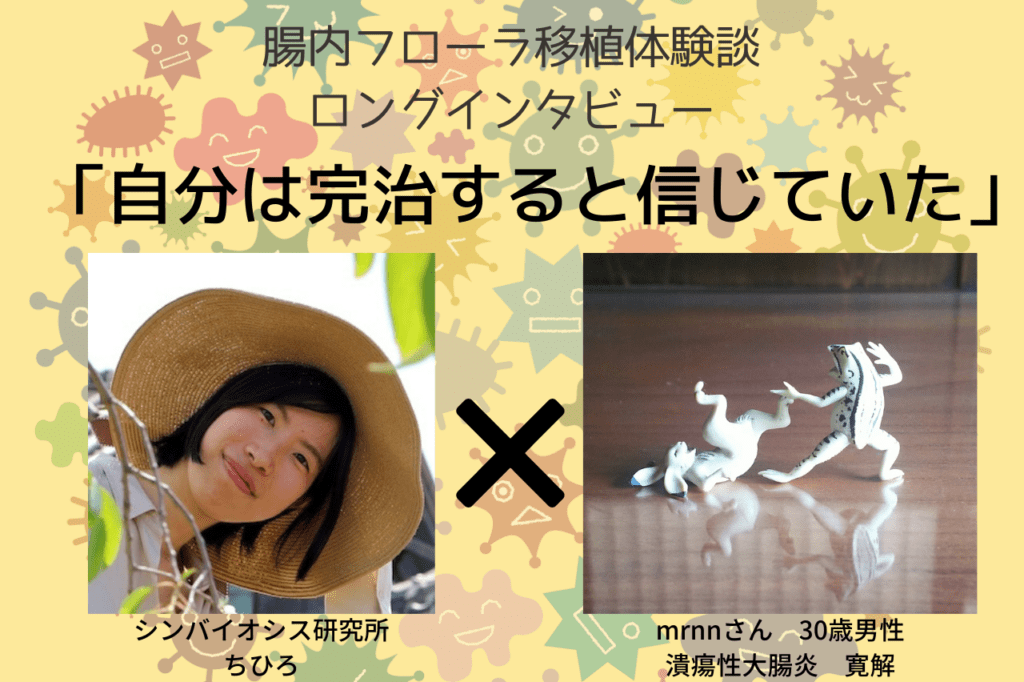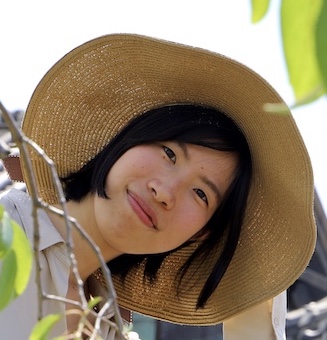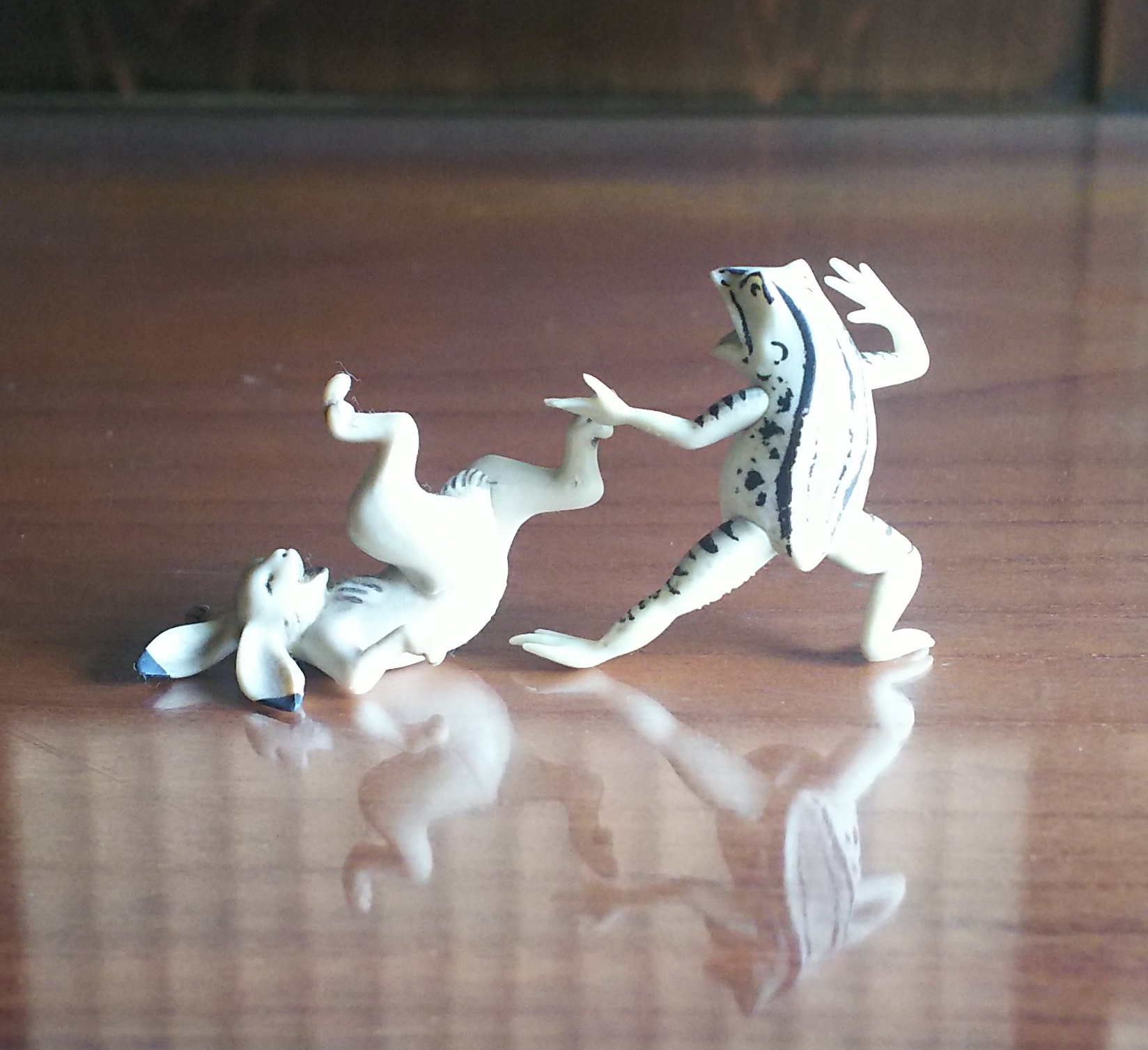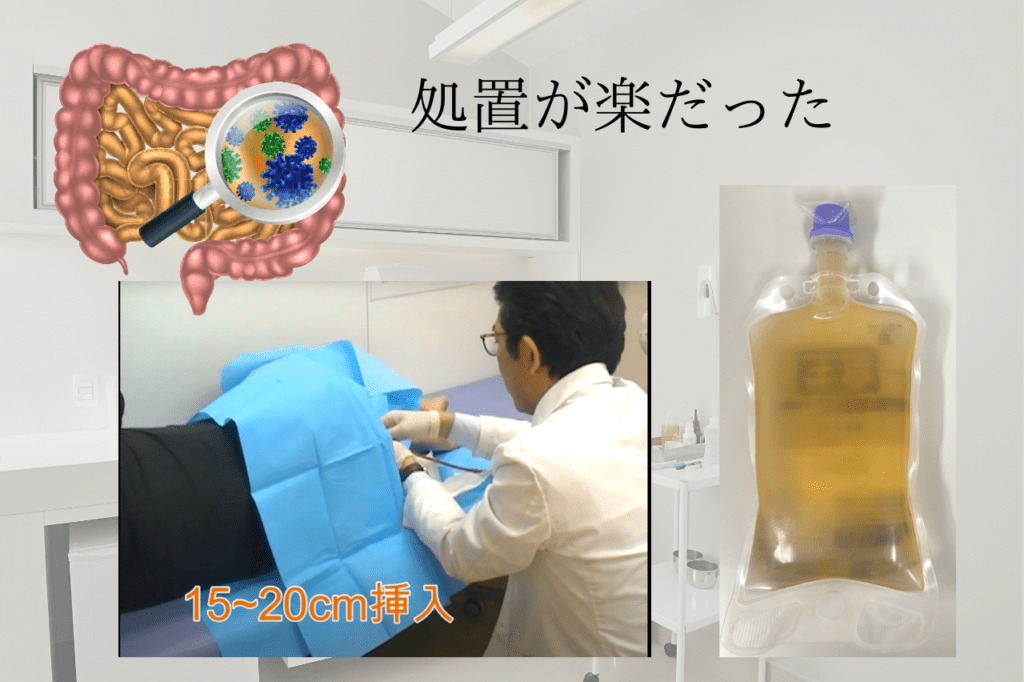After suffering from ulcerative colitis herself, mrnn studied a great deal about the risks of antibiotics, diet, and intestinal bacteria, and made the decision to undergo an intestinal flora transplant.
Her own efforts and the transplant were successful, and she was able to receive a decision from her doctor that she was in remission after a diagnosis by her primary care physician and an endoscopic examination at another hospital.
This interview was realized with the cooperation of the person himself. Chihiro (Chihiro Yamamoto) of the Symbiosis Institute served as the interviewer.

[Profile]
30-year-old male
Nickname: mrnn
Disease: Ulcerative colitis
Number of transplants: 9
Transplant attending physician: Medical Corporation Futamatakai Natural Art Clinic
(Click here for a list of Natural Art Clinic articles)
Post-transplant diagnosis: remission (based on transplant attending physician diagnosis and endoscopy at another hospital)

Thank you for taking the time to speak with us today.

Thank you, too.
Chihiro :Today, I would like to talk with you about your past and your illness, not only about the intestinal flora transplantation.
Diagnosis of ulcerative colitis and subsequent physical condition and life

Chihiro: So, mrnn, can you tell us about the symptoms you were experiencing before you were diagnosed with ulcerative colitis and what your life was like at that time?
○mrnn. : I was 22 years old and in my senior year of college when I was diagnosed with ulcerative colitis.
I went to a music college and was doing vocal music. I practiced impatiently because of the difference in level from those around me, and I caught a cold and took antibiotics a lot.
I was told by people around me and my voice teacher that gaining weight would be good for my singing, so I binge drank ramen noodles, chocolate, and cola to gain weight.
My voice became less and less clear and my body became thinner and thinner. I felt that I was not in good physical condition, but when I talked to my teacher and others around me, they told me that I was not practicing hard enough and that I was not trying hard enough, so I could not talk to anyone about it and was suffering alone.
In my third year of college, I had bloody stools, but nothing abnormal was found at the hospital, and my parents were distrustful of me.
Ever since I was a child, I was told that I was in pain and exaggerated, and I stopped telling people about my physical problems.
I had only one bloody stool and after that I had normal stools, so I forgot about it and did not make any changes in my life.
I managed to get into graduate school, but then the diarrhea got worse and I started going to the bathroom several times a day, and before I knew it I realized I was having bloody stools.
Chihiro : It must be hard for you to have symptoms that are painful for you, but the hospital can’t find anything wrong with you. Especially for mrnn-san, who is a hard worker and unconsciously concerned about the people around her, she may have pushed herself harder and harder.
What was your history before the hospital gave you the diagnosis of ulcerative colitis?
○mrnn. I had bloody stools for a long time, and around the time of my summer vacation, I went to the hospital and had an endoscopy, where I finally found out that I had ulcerative colitis.
The doctor told me that it was a disease that I would have to live with for a long time and that I could lead a normal life.
Perhaps because I appeared healthy at first glance, my parents told me not to worry about it forever and not to take a break, so I returned to school life after the summer vacation.
I graduated from graduate school after a series of remissions and relapses with medication.
From then on, I joined an opera training institute, worked on stage, and part time in the choir, living a singing life with the help of my parents, but when I was 27, a girlfriend I was dating told me that she thought I had Asperger’s. From then on, I wondered if I had Asperger’s and became depressed, unable to leave the house, and ran away from everything.
I think the hardest part was feeling sorry for my parents. I think my parents were disappointed to see me become less and less able to sing as the years went by.
But after graduation, I looked for a teacher on my own and was lucky to finally find someone I could call a mentor in life. Since then, my voice got better and better, and now my parents say I have a good voice, which made me happy. I have had a hard time with this ulcerative colitis, but I think it has become an asset to my life.
Chihiro I am sorry to hear that you have had such a difficult experience.
Before and after your symptoms began to appear, did you feel yourself under excessive mental stress or physically fatigued, in other words, did you feel any signs of illness?
○mrnn. I have felt difficulty in living at various times in my life.
Now I think that I became ill as a result of my own personal experience, or perhaps it was inevitable due to the systemic nature of our society.
One of the things I have learned since I started singing in college is that I did not like to sing in front of people. Ever since I was a child, I liked to look at beautiful things, and I was happy as a bystander just watching them exist peacefully.
However, at music schools, the emphasis was on networking rather than on honing singing and vocal skills, and the teaching style was always athletic, so they did not provide education that developed each individual’s condition and personality.
I couldn’t understand why I was the only one suffering from these symptoms when I was just living the same life as others, and all I could do was to keep denying myself.
To compensate, I would practice all night long, stay in the bathroom between performances, sing again, and then go out drinking. When I think about it now, I guess I was trying too hard, ignoring the voice of my body.
I thought I could just look at beautiful things, that I was just a soul without a body, but the pain brought me back to reality.
If the food I eat is not even slightly right, the pain is so intense that I have no choice but to stay in the bathroom. It made me sad to think how miserable I was in reality.
Chihiro I feel pain in my heart just by imagining it. It’s a lie that you are smiling and talking like this now. mrnn: Did the discovery of your disorder and illness change the way people around you look at you?
In a good or bad way?
○mrnn. : That’s the thing, ulcerative colitis is not a condition where you can see the inflammation from the outside, so there was very little sympathy or consideration for me.
My teacher forgot that I had ulcerative colitis for a long time (laughs).
I think other people don’t understand because they don’t experience the pain themselves.
That’s why it was hard for me to talk about it, even when I was in pain. I felt like I would be told that I was exaggerating.
It was hard for me to act like I was in a condition where I couldn’t do the same things that everyone else was doing.
So I gradually began to withdraw from home, unable to think of anything positive, and was in a state of depression.
I had ulcerative colitis, which is said to be incurable, and I might have Asperger’s, and on top of that, I was depressed. It was difficult to have hope.
Still, he believed he would make a full recovery.

Chihiro I am sure that it has been a long road from such a state to now being able to talk with me like this. Was there some kind of catalyst that brought you to this point?
○mrnn. I was in a state of withdrawal and depression, but for some reason I was convinced somewhere that I would recover completely.
So there was a time when I decided to face up to my ulcerative colitis, not so much as a trigger in particular. Time may have helped me sort out my feelings in some aspects.
In this process, I surprised myself with my own power to want to live.
First, I read blogs of people with the same disease and thoroughly researched the phenomenon of food-induced inflammation.
Then I put the knowledge I had acquired into action. In other words, I experimented on my own body over and over.
I tried everything I could find that was good for my health, including fasting, fiber intake, macrobiotics, sugar restriction, molecular nutrition, time nutrition, and mindfulness.
As for the food, it was difficult to identify which of the things contained in the food aggravated the symptoms.
It was also during this period that I learned that there were too many foods that contained a set of things that seemed to be the cause, such as emulsifiers, oxidized vegetable oils and fats, and other unidentified substances in katakana.
So, while fasting, I gradually introduced foods as ingredients and sorted out those that aggravated my symptoms and those that did not.
Eating the same foods as my family members would make me feel ill, so I began to cook my own food.
Then my symptoms would lessen.
I learned that my symptoms were greatly affected by what I ate by mouth.
I also realized that it is necessary to spread the word more widely that the health regimen that we are told about in the world is irresponsible, and that there are people to whom it does not apply.
Frankly speaking, I think there are very few people who can make it this far in the midst of extreme conditions, both mentally and physically. Even so, I think the reason I was able to make it this far was because I myself had complete faith that the disease could be cured.
It was also significant that I stopped looking to others for help. I want doctors to be good mentors, but they are not the ones who can cure me.
But all the methods I tried had only temporary effects.
Fasting was effective for reducing inflammation and for flushing out foods that aggravated my symptoms, but it made me feel light-headed and other discomforts. Other methods were also far from curative.
I began to feel as if I would never be able to recover.
I began to feel that way.
I felt that my health should not be like this, where I have to be nervous about every single thing that I eat.
Chihiro I guess you mean: not being aware of a disorder is a sign of good health. The staff at our institute often say this. They say that health is not something to be conscious of on purpose.
Was it during your research activities that you learned of the existence of intestinal bacteria?
○mrnn. : Yes, it is. In reading papers on ulcerative colitis, I learned that the disease is thought to be caused in part by a disorder of intestinal bacteria.
As I researched more about intestinal bacteria, I was convinced when I learned that the balance of intestinal bacteria is disrupted by the overuse of antibiotics.
My own mother had often taken antibiotics before she became pregnant, and I myself had been weak since I was a small child, repeatedly suffering from colds and diarrhea. I did not know that antibiotics are drugs to control bacteria, and that taking them to control the symptoms of a viral cold would be pointless. Nor did the doctors tell me about the risks of antibiotics. I am sure I did not know that.
At the same time, I began to think that intestinal bacteria may be irreversible.
I began to think that the leaky gut caused by emulsifiers and surfactants and the changes in the balance of intestinal bacteria caused by antibiotics may never be reversed, that the intestinal bacteria that have been passed down over hundreds of millions of years may no longer be passed down, and that this is not a problem that individuals can do anything about. It is not a problem that can be handled by individuals.
When I realized this, I felt I understood a little more about the reason why my life has been so difficult to live.
Chihiro: Indeed, the general view is that it is difficult to significantly change the state of intestinal bacteria cultivated in childhood. That is why you found the method of intestinal flora transplantation (fecal transplantation, FMT).
○mrnn. I learned about intestinal flora transplantation through the blog of someone with the same disease.
I was involved in a car accident. I wasn’t seriously injured, but my mother was.
I realized firsthand how wonderful the Japanese medical system is.
I felt a sense of security and gratitude that an ambulance would come immediately and treat her at the hospital. I was reminded that the use of antibiotics is also important in such situations.
It was an event that changed my outlook on life, as I realized that it is important to think of antibiotics not as something to be dismissed out of hand, but as something to be used with care only in necessary situations.
It was also around the same time that I developed a desire to undergo transplantation myself. I thought I would have to try it myself to see if it would work or not, and I had hope that it might restore my intestinal bacteria to the right state.
Although there are still few places in Japan where you can receive this treatment, some university hospitals are recruiting participants in the form of a clinical trial for ulcerative colitis.
I thought about participating in a clinical trial at one university hospital, but decided against it because I was concerned about the risk of having to use antibiotics before the transplant. I felt that even though I have intestinal bacteria in my gut now, going out of my way to kill them is based on the same thinking as conventional medicine.
So I continued my research and happened to learn about the Symbiosis Institute on Twitter. I decided to go there because they were particular about not using endoscopes or antibiotics and their transplantation methods.
Chihiro : Nowadays, there are many different protocols being tried regarding intestinal flora transplantation, aren’t there? We are afraid that methods that place a heavy burden on patients, such as endoscopes and antibiotics, will become the standard method.
Did you have any other reasons to be hesitant about transplantation, such as the fact that it is not a clinical trial but a private research group transplantation?
○mrnn. I think it is the cost. I think that if the price here becomes more affordable, the number of patients who receive treatment at the Intestinal Flora Transplant Clinical Study Group will increase significantly.
Information was disclosed about the technical and safety aspects, and I had no concerns in light of the knowledge I had studied. In fact, I was often convinced by what was written in the Symbiosis Institute’s blog.
Thankfully, I was in an environment where I could afford to undergo an intestinal flora transplant in terms of cost.
I thought to myself, “If I can pay for it, I can have it too”.
The fact that intestinal flora transplantation is available in Japan is thanks to Dr. Shimizu (Senior Researcher, Symbiosis Institute), who has been conducting microbiological research for nearly 40 years and has established his own method of intestinal flora transplantation, despite criticism from others. I am also grateful to all the donors.
Thank you very much.
Chihiro: Cost. We want to lower the cost. We will do our best to improve the accuracy of the bacterial solution, of course, but we will also do our best to reduce costs. I promise. Whether we work in the direction of receiving government subsidies or focus on dissemination activities to generate economies of scale, either way, it’s difficult because we need “excellent people who will work for the cause with salaries that can’t be called high.
Is this the fate of non-profit organizations and social businesses?
Actually undergoing a transplant.

Chihiro : mrnn, you received a total of nine transplants, including three additional transplants in addition to the six-transplant course. Can you tell us what kind of experience you had with the transplant?
I think this is what people who are considering a transplant want to know the most.
○mrnn. I felt like every cell in my body was being replaced the first time I took it. I felt that it was working really well! I was sure that it was working really well. The bacteria solution looked very thin, but I had a very good feeling, probably because I had a completely different set of intestinal bacteria living inside me all at once.
The procedure was so easy that it was almost a surprise to me. The endoscopy was very painful, so I was grateful for that.
He explained that he would gradually increase the concentration of the fungal solution and let my immune system get used to it so that it would not react too strongly. My body felt warmer, my stomach was more comfortable, and I felt mentally relieved in a huff.
As I continued with two, three, and four times, I felt a sense of physical and mental ease, though not as dramatic as the first time. I had clean, banana-like stools for the first time in a very long time.
I had constipation and soft stools, but it was not so unpleasant to have a stool condition that was out of control, or if I may say it was like a healthy person having constipation or diarrhea.
I was happy to hear the doctor tell me that when the bacteria solution was added, my organs that had not been moving were starting to move.
Other things improved: my hair quality and skin tone improved, and the acne and redness of my nose decreased. My body temperature had also increased.
I hoped that the inflammation in my intestines would continue to go away.
After the fourth session, I was able to sleep well for the first time in a long time, about 8 hours, and my irritability was gone and I felt more mental calm.
The feeling of reluctance, abdominal pain, and inflammation flooding through my anus was also decreasing.
Around this time, I felt a pleasant sense of relief rather than a feeling of “it’s working”.
However, there was a phenomenon like a pullback in the 5th and 6th sessions. The human body has an instinct called “homeostasis,” or the instinct to stay in the current state, and this may be it.
Actually, I was already in a good state by the fourth session, so I was a little reluctant to change the balance any further.
Sure enough, I felt a little uncomfortable when I put in the fifth one, and by the time I got to the sixth one, I felt as if my stools were returning to normal.
This depressed me mentally.
I almost thought, “I guess it’s not coming back after all,” and I was a little tired of feeling happy or sad.
But because I believed in the potential of the intestinal flora transplant, I decided to do three additional transplants.
The seventh transplant was good for my experience…I was still having muddy stools after the sixth transplant, but they were gradually becoming solid and I was feeling a mental brightening.
I was also dreading the food I was eating, but gradually I increased the amount of fiber in my diet by reducing white rice to 7 parts white and adding quinoa and oatmeal.
The 8th and 9th transplants also felt good, and my stools were going back and forth, but I was not feeling bad.
And a while after the 9th transplant, my stool condition is stabilizing.
I recently had an endoscopy at another hospital and they said I should be in remission!
Chihiro : That makes me too happy! It is the result of your own efforts. I am amazed that you have believed in us so far. Let’s keep looking at it in the long run, shall we?
○mrnn. : Yes, I would like to continue to do that. Also, I’d like to continue to do additional transplants as a kind of maintenance, even if it’s at intervals of two weeks, a month, and so on, so that my gut bacteria can get along with the new gut bacteria and my body can get used to it.
To be honest, I’m still afraid to stop the medication now. I want to be able to eat a wider variety of foods, and even if I do get sick because I am human, I want my body to be able to return to normal.
It’s hard to define normal, but I have a strong desire to be in the same state of health as the average person.
Intestinal bacteria is something that integrates the various western and eastern medicine that I have learned and tried. They explain things that current medicine cannot explain. I feel like I have potential, even though it varies from person to person.
Perhaps it was the positive mental state I was able to achieve after the transplant that helped me to think this way.
Chihiro : Transplantation as maintenance is a good way to think about it. According to medical common sense, the goal is often “how to get the patient to graduate,” but health is something that is maintained throughout life, and just as we take care of exercise, diet, and sleep all the time, we should also take care of our intestinal environment. It’s modern life, so it can’t always be perfect, but it’s maintenance for those times when it is.
What I can do because I have experienced the disease

Chihiro : Of course it is better not to have a painful disease in the first place, but looking back now, is there anything you have gained or realized by experiencing the disease?
○mrnn. I have told you that I used to think that my soul alone was enough, and that the pain of ulcerative colitis forced me to turn my attention to my actual physical body.
But because of that, I was forced to reflect and reflect on “myself” for the first time. It was because of the pain and suffering that I was able to face myself head-on.
It may sound ironic, but perhaps it was because I became ill that I was able to feel a real sense of living.
I was able to praise myself and only myself for my efforts to live with the pain and suffering, no matter what others might say about me.
It was also great to realize that I had intestinal bacteria in my body that supported me without my knowing it. The brain is important too, but the idea that I was living with only this thought was a big arrogance.
I couldn’t notice happiness without pain. I want to tell my old self that I did a great job.
Chihiro I am so glad that you have managed to live this long. I am sure that many happy things will happen in your life from now on. Is there anything you would like to work on in the future?
○mrnn. : There are many things I have given up because of my ulcerative colitis. I have lost some relationships.
Because I am in such a clean slate, I would like to find out what I can do.
I am one of the people who are strongly feeling the possibility of intestinal flora transplantation, and I would like to share my knowledge and experience if possible.
The health information that you can find on the Internet is a mixture of boulders. And it does not apply to everyone.
That is why I want to transmit what I have researched and what I have tried.
The intergenerational relay of gut bacteria is now in jeopardy. Any disease related to inflammation is very likely to be related to gut bacteria.
If we are healthy now, our own daily activities may be an act of disrespect and distancing of our gut bacteria. If so, we make our children and their offspring unhappy.
More and more people will no longer take their health for granted.
For those who are suffering now, I want to do whatever I can to help.
I also want to do what I can to help as many people as possible so that they do not have to feel the pain and suffering that I have felt.
The intestinal flora is determined to a certain extent when a mother is pregnant, at the moment of birth, and about a year afterwards. So I hope that society will give priority to babies and children, and that those who need it will have intestinal flora transplants before it is too late.
This is something I wanted to spread even if the transplant did not work for me. The Intestinal Flora Transplant Clinical Study Group and Symbiosis Institute have yet to publish a clinical case study, but even with other common methods of stool transplantation, there is a 20 or 30 percent remission rate for ulcerative colitis.
It is designated as an incurable disease with no cure, and the current standard therapy has a similar remission rate. It is rather strange why only intestinal flora transplantation is not approved.
Chihiro: Based on your own experience, do you have any message for patients and their families who are suffering from the disease and feel like they are in a long dark tunnel?
○mrnn. : No words may ever reach someone who is suffering from symptoms right now.
You are already doing more than enough to fight your illness every day to do something about this pain right now.
I am sure that your family members who support you around you are also worrying every day.
There are people who are doing research every day to cure diseases.
Even if the cause is unknown at the moment, there is always a cause.
Fortunately, through intestinal bacteria, the causes of various diseases can be connected, and we are now in an age when there is a possibility of cure.
Please do not give up and live with us.

Thank you very much. I may not be in a state of health where I can give myself 100 points yet, but it was a time when I felt a light similar to that of confidence that mrnn-san will surely lead a healthier and happier life than anyone else. Thank you very much.














